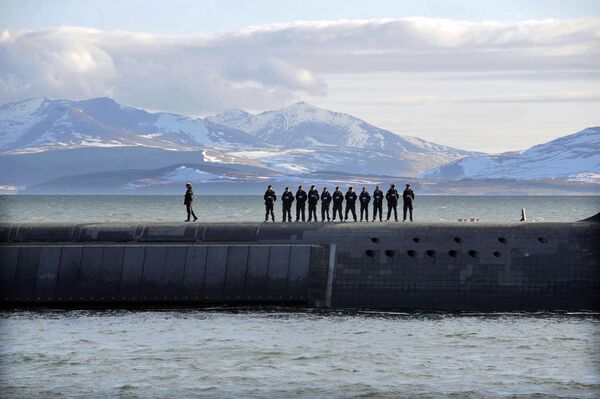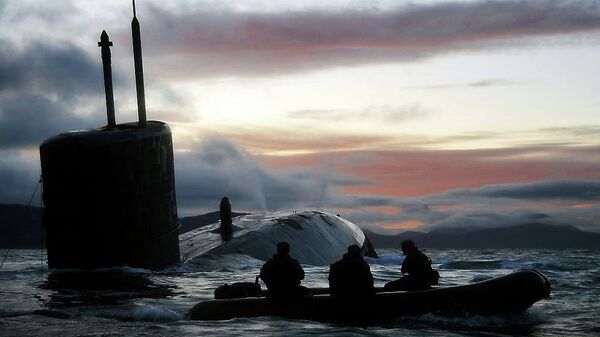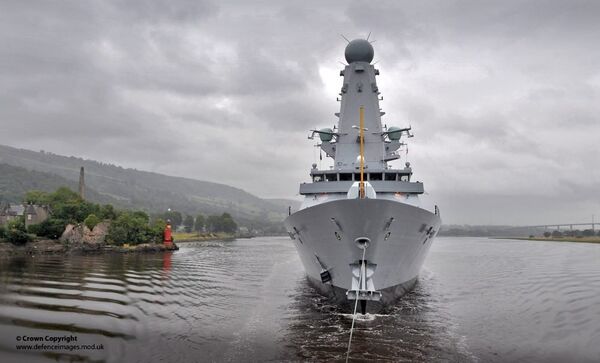Five submarines, including HMS Triumph, Torbay, Artful, Talent and Trenchant, are under repair after breaking down while HMS Ambush is being fixed after crashing into a merchant ship in the Gibraltar area in July 2016, according to The Sun newspaper.
Professor Anthony Glees, expert in politics, security and intelligence from the University of Buckingham, believes that this is extremely bad timing for Britain to demonstrate to the world that its defenses are weak.
Article 50, the vehicle by which Britain leaves the European Union, was backed unanimously by UK MPs on February 8, allowing Theresa May to trigger formal Brexit proceedings. Riding solo, Britain may find itself in greater need of ensuring the security of its borders.
A stunning Scottish west coast sunrise heralds the arrival of HMS TRIUMPH, a @RoyalNavy Trafalgar Class submarine to HMNB Clyde. pic.twitter.com/qbjhZ3e0D9
— #MadeInTheRoyalNavy (@TeamRN1) January 27, 2017
"When it comes to policing our borders with ships, we need a strong fleet. But my feeling is that security depends on the success of the economy. I think that everyone agrees that as a result of Brexit Britain is going to be poorer rather than richer," Professor Glees told Sputnik.
This is not the first time however that the Royal Navy have had defense fleet problems. In November 2016 it was reported that the UK's Royal Fleet will be left without an anti-ship missile due to budgetary concerns.
Royal Navy will be withdrawing Harpoon from service in 2018 — https://t.co/msZ99AS7yJ pic.twitter.com/PiL2GKVXsI
— Alert 5 (@alert5) November 14, 2016
In the same month, a UK Royal Navy Type 45 destroyer had to be towed back into port just two days after it sailed, following a total propulsion failure while taking part in NATO exercises.
"The bottom line is that this is embarrassing for the government — if we are a global Britain with global interest we need to defend this. This is particular bad news for [Theresa] May's Brexit government," Professor Glees told Sputnik.
The @RoyalNavy is on duty 24 hrs a day, 7 days a week, 365 days a year, at sea, on land and in the air.#ProtectingOurNationsInterests pic.twitter.com/0nRLBHMH5c
— #MadeInTheRoyalNavy (@TeamRN1) 9 February 2017
Professor Glees also doesn't believe that Theresa May has taken "her eyes off the ball", but that the issues with the Royal Navy fleet implicates former UK Prime Ministers David Cameron, Gordon Brown and Tony Blair, as it's a very long term investment.
"I don't think this reflects on her [May's] competence but what will reflect on her competence is the reason she gives. Britain will be poorer and will the tax payer be prepared to spend a lot of money on defense? Most people voted for Brexit to cut costs," Professor Glees added.
While Trident, UK's nuclear program, gives Britain the power to "punch above its weight," it could also undermine the role of warships in UK's security, Professor Glees told Sputnik.

"When you think about defense — you think about Trident. It's Trident that gives Britain the power to punch above its weight, it's not these warships. Brexiters could see the future of Britain's defense via Trident, while the fleet will no longer be significant."
For Professor Glees, the most embarrassing moment for the current government is that Theresa May's vision of a future Britain looks rather different from what she has been telling people.
"We are far from being bigger and stronger, we are likely to be smaller and weaker. What you see happening to our ships is an indication of that. The picture looks gloomy and it's an embarrassment for a British PM. Trying to make Britain look like a glorious country. We used to be an empire, that the sun never set on, that's when we needed a fleet. Not now," Glees added.



